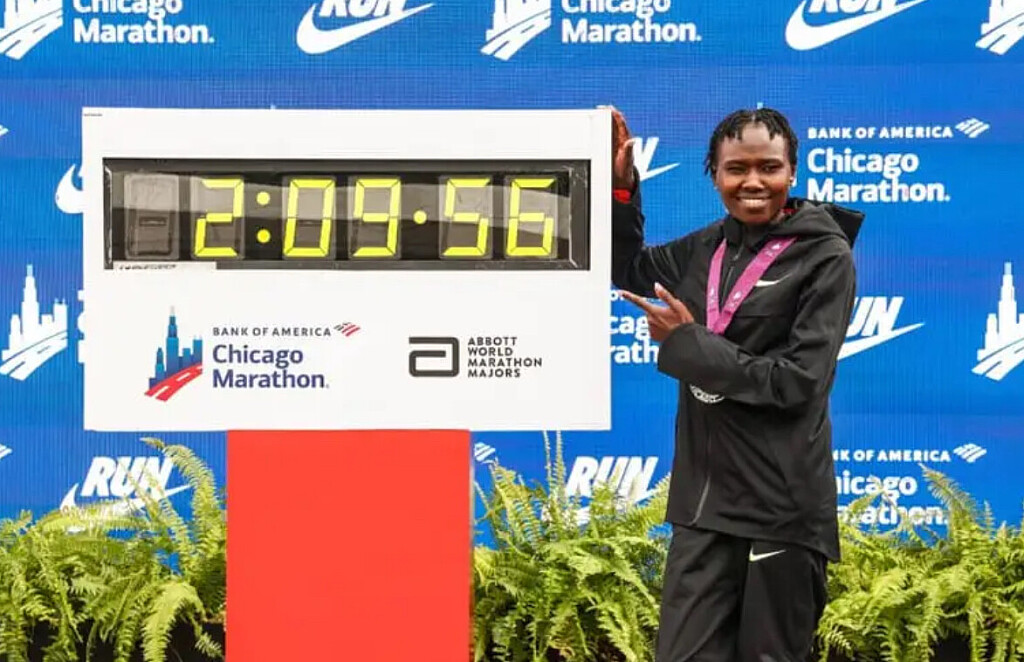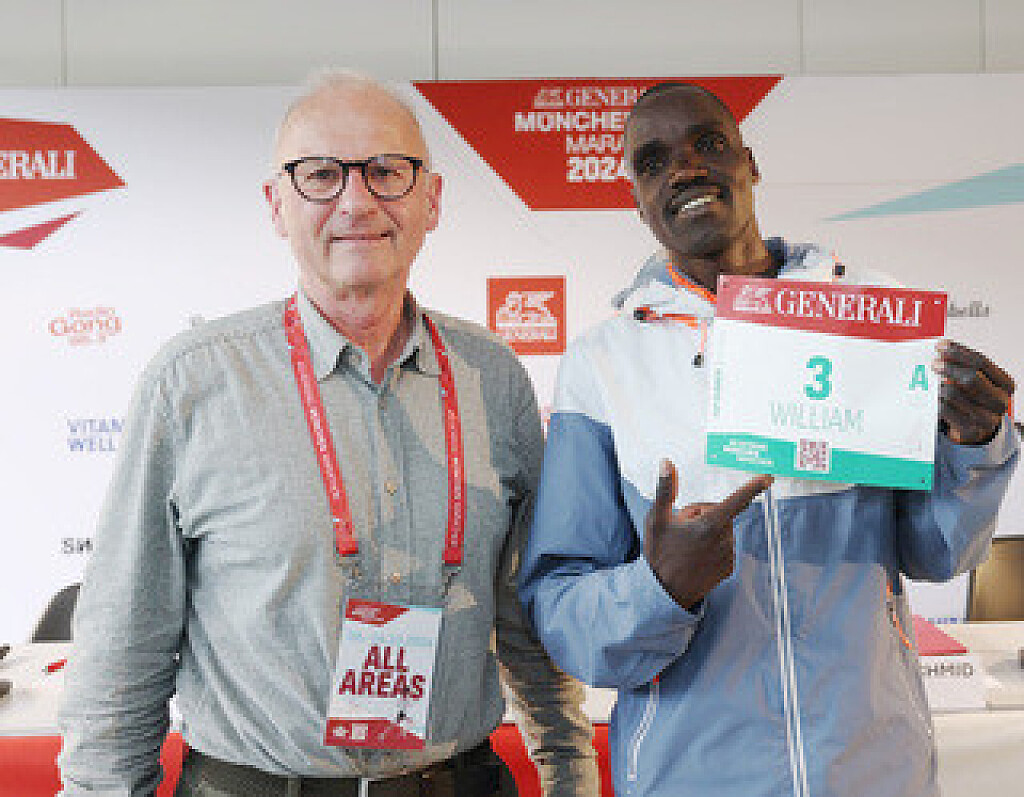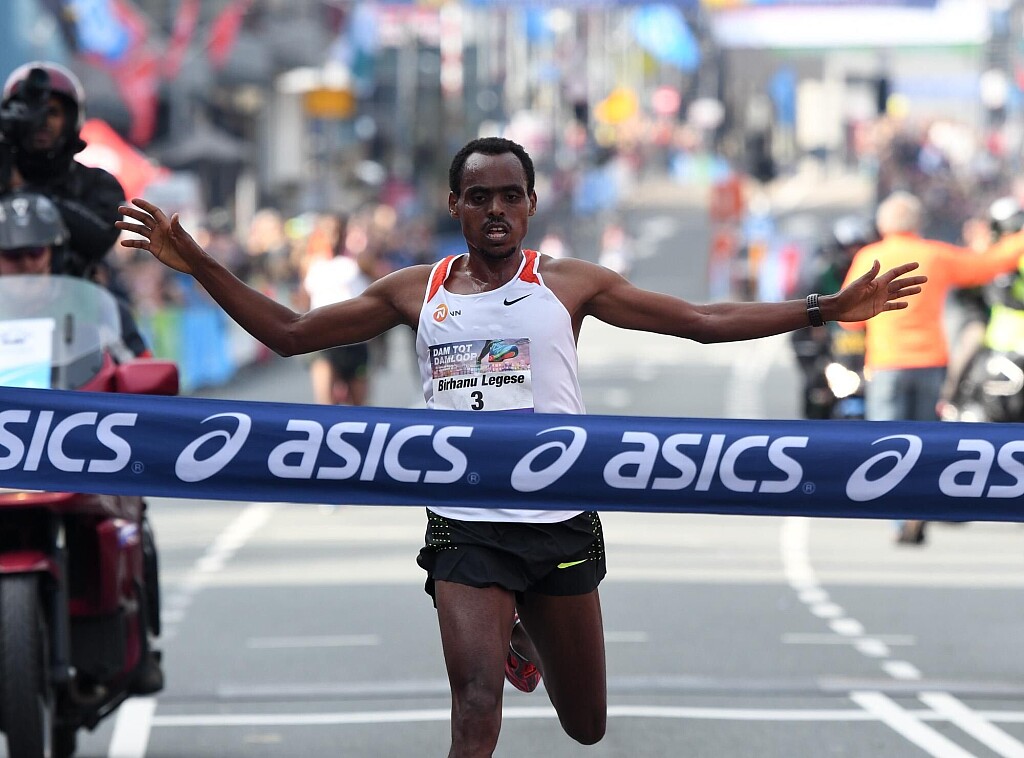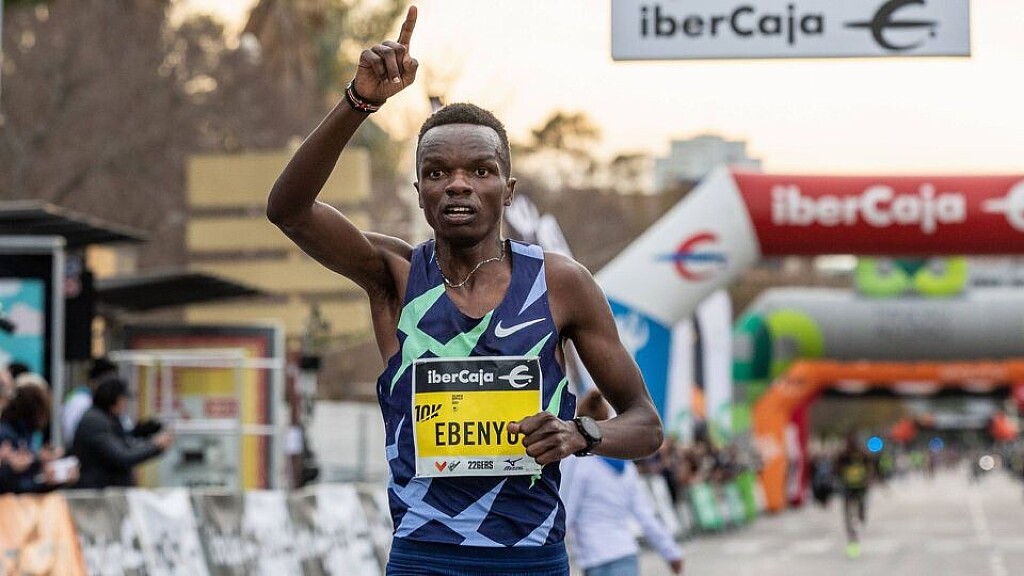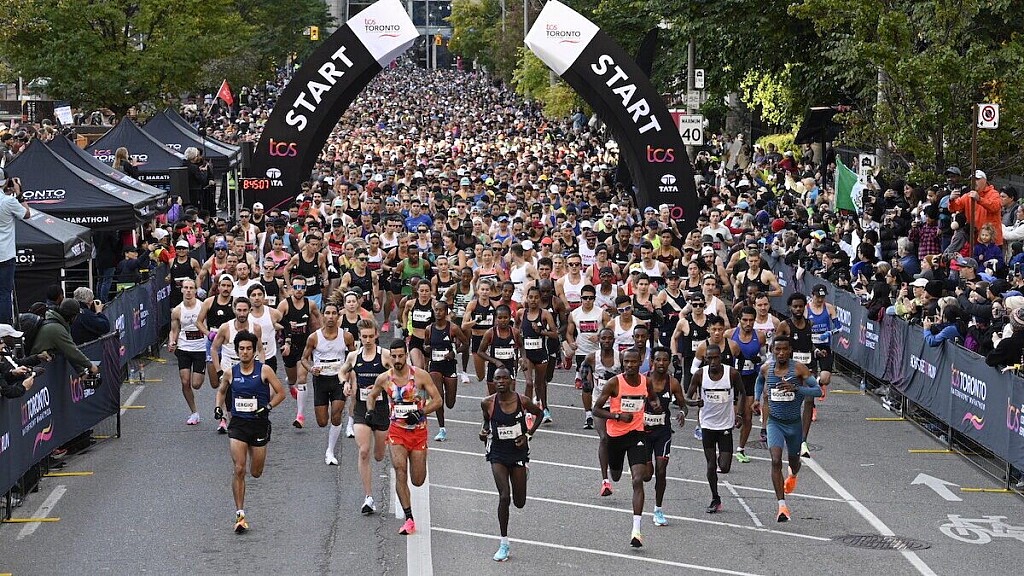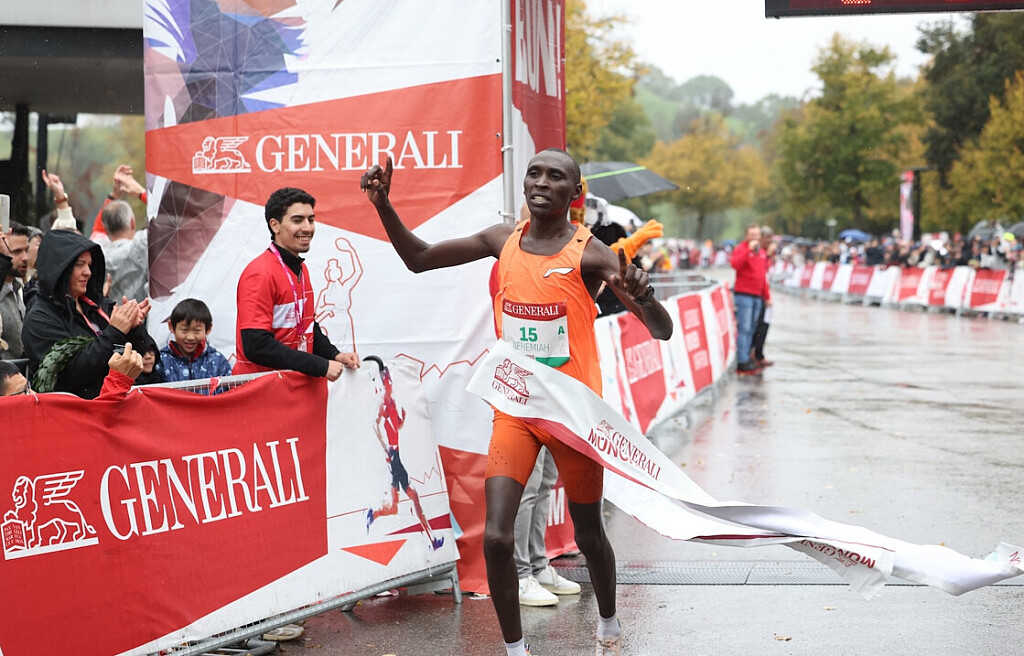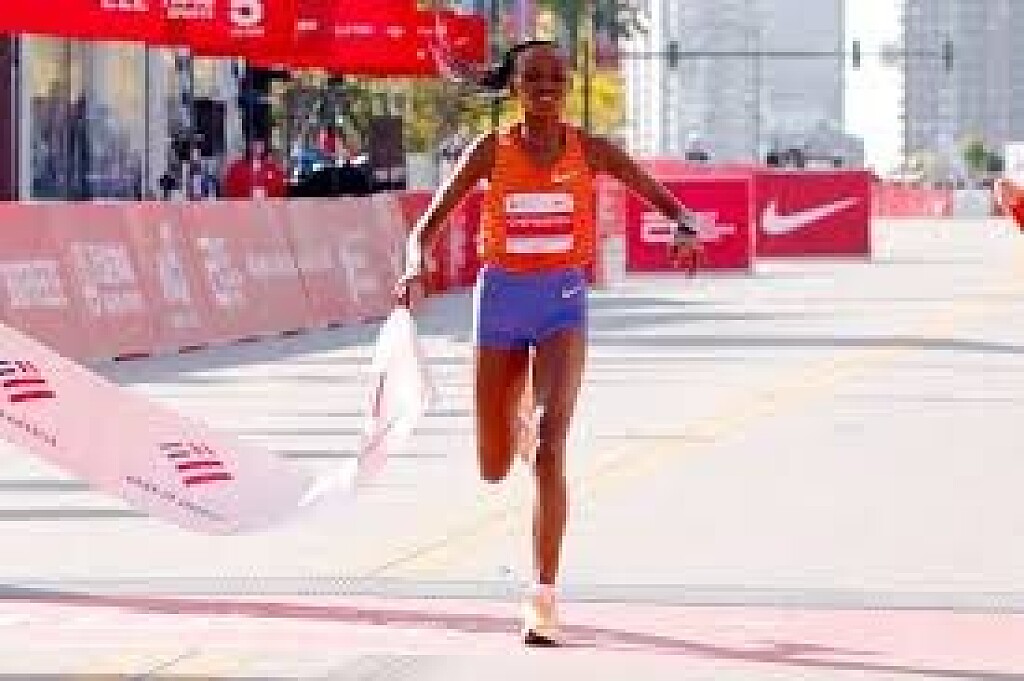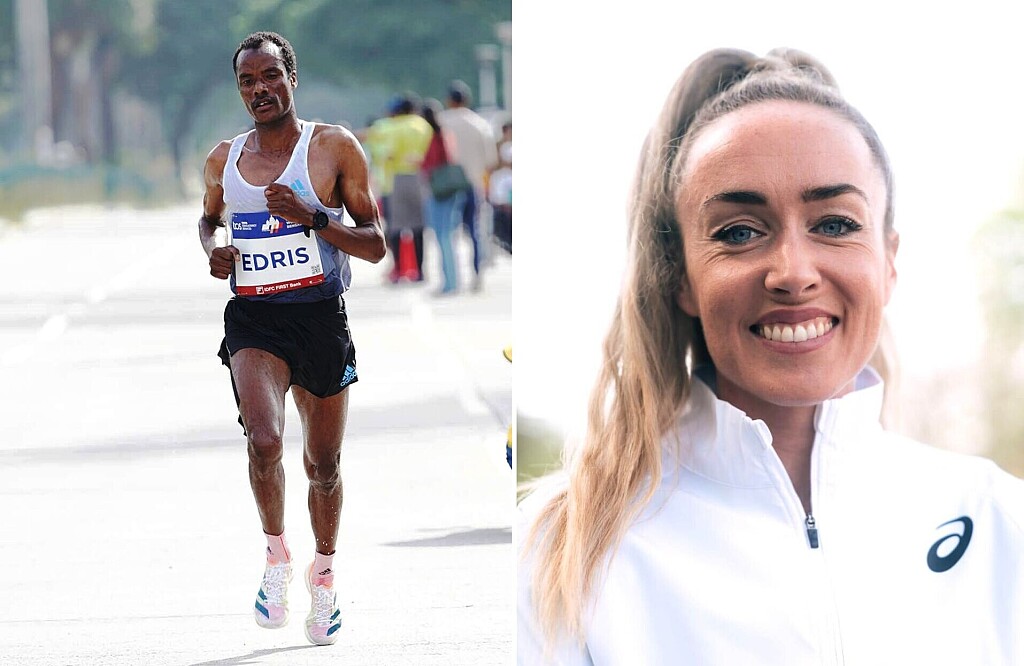Running News Daily
Top Ten Stories of the Week
10/19/2024
These are the top ten stories based on views over the last week.
Another look at the new women’s marathon record set in Chicago today
30-year-old Kenyan Ruth Chepngetich destroyed the women’s marathon world record today (13 Oct. 2024) at the 46th Bank of America Chicago Marathon. Her time of 2:09:56 ripped 1:57 from the previous mark set in Berlin 2023 by Ethiopia’s Tigst Assefa (2:11:53).
At this point, the athletics record book feels like it ought to be written in No. 2 Ticonderoga pencil. That’s how fast records fall in this age of technological and nutritional advances. This is especially true at the longer distances where such advancements create greater margins.
Still, Ruth Chepngetich’s new world record stands out as history’s first women’s sub-2:10, and first sub-5:00 per mile pace average. But Tigst Assefa’s 2:11:53 mark set last year in Berlin had us all cradling our heads, as well. That performance cut 2:11 off Brigid Kosgei‘s 2:14:04 record from Chicago 2019, which shattered Paula Radcliffe‘s seemingly impregnable 2:15:25 set in London 2003.
In each case: Radcliffe’s, Kosgei’s, Assefa’s, and now Chepngetich’s record have caused mouths to gape in the immediacy of their efforts. But nothing should surprise us anymore.
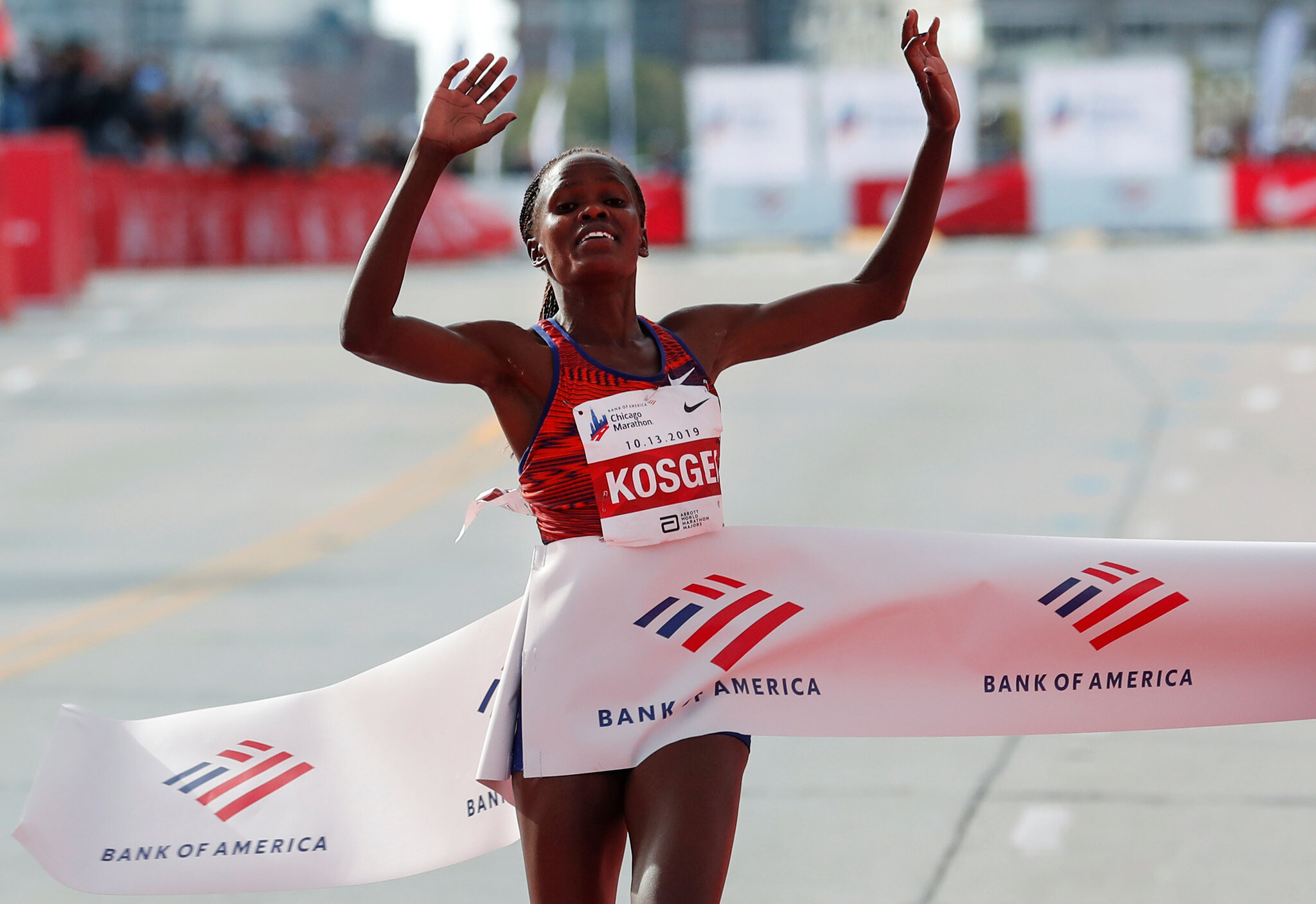
Racing is often a self-fulfilling prophecy determined by one’s build-up. Ruth Chepngetich said in her TV interview she came into Chicago off a perfect three-months of training after her disappointing ninth-place finish in London in April (2:24:36). Two previous wins in the Windy City (2021 and 2022) and a runner-up in 2023 meant Ms. Chepngetich arrived well seasoned on this course, with a keen understanding of what training was required to produce such a record run.
Of course, sadly, no record in athletics can be free of skepticism considering the industrial level of PED use that is uncovered, seemingly, every other Tuesday. Though understandable, cynicism should not be one’s default reaction.
To maintain any allegiance to the game, to follow it with any interest at all, we have to celebrate each record at face value. Just as rabid fans have to acknowledge some records to be ill-gotten, cynics accept that many special runs are exactly as they appear, above reproach.
Besides, when you break down Ruth’s 5k splits, each one from 5k to 35k was slower than the previous 5k. Not until the split from 35k to 40k (15:39) did she run faster than the split before (15:43 from 30 to 35k)
5k – 15:0010k – 30:14 (15:14)15k – 45:32 (15:18)20k – 60:51 (15:19)25k – 1:16:17 (15:26)30k – 1:31:40 (15:32)35k – 1:47:32 (15:43)40k – 2:03:11 (15:39)Fini – 2:09:56
1st half – 64:162nd half – 65:40
So congratulations to Ruth Chepngetich and her team for a marvelous run through a beautiful city. Now, let’s see how long this mark stays on the books before the No. 2 Ticonderoga pencil gets pulled out again.
BY THE NUMBERS
There have been 26 women’s world records set in the marathon since Beth Bonner‘s 2:55:22 in New York City in 1971. Over the ensuing 53 years, the average percentage change from one record to the next has been 1:26%. See WOMEN’S WORLD RECORD PROGRESSION.
Today’s record by Ruth Chepngetich, 2:09:56 (just one second slower than Bill Rodgers‘ American men’s record in Boston 1975!), lowered Tigst Assefa’s 2:11:53 mark by a healthy 1.5%. And Assefa’s time cut Brigid Kosgei’s 2:14:04 by 1.65%.
These latest records are still taking significant chunks off their predecessors and doing so in quick order. That suggests women are far from slicing everything they can from even this new record.
Yet, when comparing the women’s marathon world record to the men’s (2:00:35, set by Kelvin Kiptum in Chicago 2023), we see a differential of 7.2%. That is by far the best women’s record vis-à-vis the men’s throughout the running spectrum. Second place on that list is Florence Griffith-Joyner‘s 10.49 100m in relation to Usain Bolt‘s 9.58, a percentage difference of 8.675%.
The traditional rule of thumb has been a 10% gap between men’s and women’s records. But there are so many factors in play, it is difficult to make any definitive statement that explains one event, much less one athlete from another. I guess that’s why we keep watching.
(10/13/24) Views: 186Toni Reavis
Kenyans target a double hat-trick in Munich
Kenya’s elite runners target a double hat-trick at Sunday’s Generali Munich Marathon: If successful it will be the third time in a row that runners from this country take Germany’s fourth biggest marathon race.
Cosmas Birech and Shamilah Kipsiror are heading the start list with personal bests of 2:08:03 and 2:27:33 respectively.
Organizers registered a record total of over 27,000 entries from 120 countries for the 38th edition of the Generali Munich Marathon, which will start and finish next to the iconic Munich Olympic Stadium. Due to building works in the arena runners can not finish inside on the track this year. While the total figure includes races at shorter distances there will be around 6,200 marathon runners on Sunday.
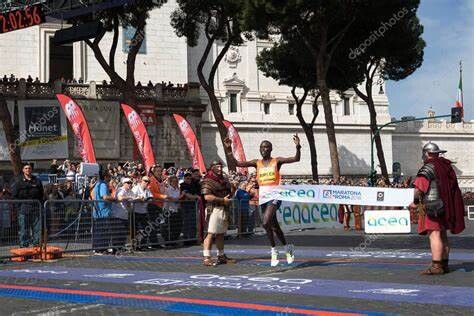
A number of athletes had to cancel their start due to either injuries of visa problems. The latest withdrawal came from Dominic Nyairo of Kenya, who would have been a strong favorite on Sunday. However there is still enough talent left to produce a good race. “It is our aim to achieve winning times of sub 2:09 and sub 2:26,“ said Michael Kraus, the elite field coordinator. The weather might be challenging, but we remain optimistic to see faster winning times than last year.“
Cosmas Birech ran his personal record when he won the Rome Marathon in 2018 with 2:08:03. Rome is not known as a particularly fast course, so Birech hopes to achieve a similar time at the Generali Munich Marathon. Fellow Kenyans William Kibor and Benard Chumba are also among the favorites. Kibor has a PB of 2:08:32 from the Vienna City Marathon back in 2012 and Chumba ran 2:10:33 in Marrakech last year. All three of them are from Kaptagat and train together. “My training went very well and I feel that I am in the same kind of shape as when I ran my personal best. If the weather is good I hope to run between 2:07 and 2:09 on Sunday,“ said William Kibor at Friday’s press conference in Munich.
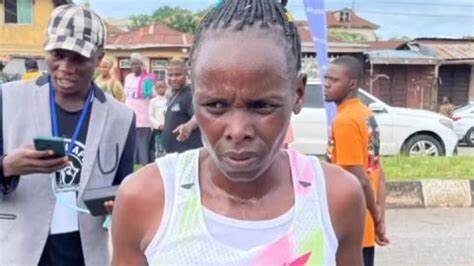
A marathon debutant could do very well on Sunday: Kenya’s Nehemiah Kipyegon showed very promising form recently. The 26 year-old improved his half marathon PB to 60:34 in Copenhagen last month. In the highly competitive race he finished ninth. Siyum Tola of Ethiopia is another athlete who will run his debut in the Generali Munich Marathon. He has been involved in marathons as a pacemaker and is a training partner of Milkesa Mengesha who won the Berlin Marathon two weeks ago.
In the women’s race Shamilah Kipsiror will be the main favorite. The Kenyan improved to 2:27:33 for fourth place in Rome this spring. Her half marathon PB of 67:53 indicates that there is potentially more to come, especially on a flat course like Munich. A trio of Ethiopians will most likely be her strongest rivals on Sunday. Gelane Senbete has a personal record of 2:29:54 while Gadise Negasa has run 2:30:30. Asmare Assefa could be in for a surprise and a big improvement. So far she has not run faster than 2:33:10 but the Generali Munich Marathon will be her first race outside Africa. Assefa is in the same training group with Tola and Mengesha in Addis Ababa.
“We are thrilled by the record entry which means we have a 20 percent surge compared to last year. We are proud of these figures which show that our event and the course are really popular,“ said Gernot Weigl, who runs the Generali Munich Marathon as Race Director for almost 25 years. Stronger elite fields and international media work have helped bring up the numbers recently.
Although the city of Munich benefits from the growing number of international runners the event attracts, it was Munich’s government that clouded the future of the Generali Munich Marathon. Officers of the city’s district department (Kreisverwaltungsreferat) decided to pass on the right of staging a marathon in the city to a new organizer who has never ever staged a road race. There is talk of a two-lap marathon course and it looks as if the city of Munich gambles with a successful international event that in addition keeps a legacy of the 1972 Munich Olympic Games. “I have never heard of anything like this happening to a major international marathon race,” said Gernot Weigl, who is now legally challenging the decision of the Munich district department.
(10/11/24) Views: 178AIMS
Legese and Chepngetich lead Chicago Marathon fields
Ruth Chepngetich heads to the Bank of America Chicago Marathon on the hunt for a hat trick, while Birhanu Legese is the fastest in the men’s field for the World Athletics Platinum Label road race on Sunday (13).
The women’s race features a clash between Chepngetich, her Kenyan compatriot Joyciline Jepkosgei and Ethiopia’s Sutume Kebede – three sub-2:17 runners who form part of a field that includes another six women to have dipped under 2:20.
Chepngetich, the 2019 world marathon champion, won in Chicago in 2021 and 2022, and followed that with a runner-up finish to Sifan Hassan last year. She clocked 2:14:18 on that occasion, while her PB of 2:14:18 set in Chicago in 2022 makes her the fourth fastest women’s marathon runner in history.
She ran 2:24:36 for her most recent marathon, in London in April, and placed ninth, but then clocked 1:05:58 to win the 21k Buenos Aires half marathon in August.
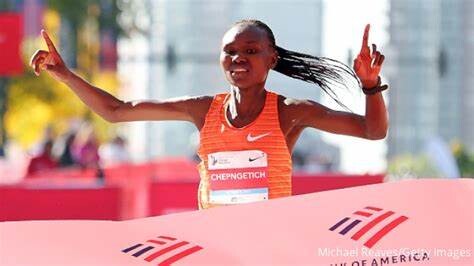
Jepkosgei, who won the London Marathon in 2021 and New York City Marathon in 2019, finished fourth in Chicago last year in 2:17:23.
She improved by one place when returning to marathon action in London in April, setting a PB of 2:16:24.
It’s Kebede who leads this season’s top list, thanks to the PB of 2:15:55 she set to win the Tokyo Marathon in March. That puts her at No.8 all time and she will be hoping to make the most of the fast course in Chicago.
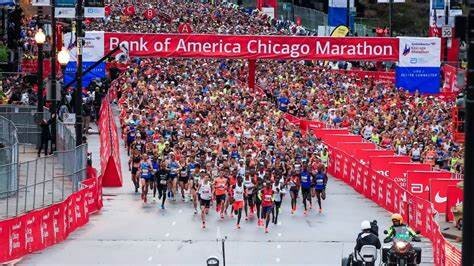
“After seeing what my teammate Kelvin Kiptum did last year, I want to come to Chicago to do something great,” said Kebede, who finished 15th in last year’s race.
Kiptum, who was part of Kebede’s training group, died in a road traffic accident in February, just four months after he set his world marathon record of 2:00:35 in Chicago. This year, the event will honour Kiptum’s legacy with a moment of silence at the start line.
Joining Chepngetich, Jepkosgei and Kebede on that start line will be three more women with PBs under 2:18 – Ethiopia’s Degitu Azimeraw, Ashete Bekere and Hiwot Gebrekidan – plus Kenya’s Irine Cheptai, who ran 2:18:22 in Hamburg in April.
The field also features the second and third fastest ever US women’s marathon runners, Keira D’Amato and Betsy Saina, who have also dipped under 2:20. They are joined in this competitive field by their compatriots Sara Hall and Emma Bates.
Ethiopia’s Legese leads the men’s field with the PB of 2:02:48 he ran in Berlin in 2019. That performance puts him sixth on the men’s world marathon all-time list but since then his highest marathon finish has been a third place, achieved in Rotterdam with a 2:05:16 run in April.
The two-time Tokyo Marathon champion will want to return to winning ways when he heads back to Chicago, where he placed 10th when making his World Marathon Majors debut in 2018, but he faces tough opposition.
Six other men in the field have PBs faster than 2:06, including Kenya’s Amos Kipruto, Vincent Ngetich and John Korir, and Ethiopia’s Dawit Wolde, Amedework Walelegn and Mohamed Esa.
Kipruto, the 2019 world bronze medallist, and Ngetich have matching PBs of 2:03:13. Kipruto won the London Marathon in 2022 and trains with Benson Kipruto, who won that year’s Chicago Marathon, while Ngetich was second in the Berlin Marathon last year, five places ahead of Kipruto. He was also third at this year’s Tokyo Marathon.
Korir ran his PB of 2:05:01 when finishing third in Chicago in 2022, while Wolde ran 2:03:48 in Valencia last year, Esa has a best of 2:05:05 from Amsterdam in 2022 and Walelegn clocked 2:04:50 in Rotterdam in April, finishing runner-up – one place ahead of Legese.
Looking to join them at the front of the field will be Kenya’s Daniel Ebenyo, the world 10,000m and half marathon silver medallist who makes his marathon debut. The 29-year-old ran a 59:30 half marathon in Berlin in April, 26 seconds off his PB set in Manama in 2022.
Ethiopia’s Jemal Yimer Mekonnen, who finished fourth in the half marathon at last year’s World Road Running Championships behind runner-up Ebenyo, is back in marathon action after his win in Seoul in March.
Among the athletes racing on home soil are USA’s Zach Panning, CJ Albertson and Brian Shrader.
Elite fields
WomenRuth Chepngetich (KEN) 2:14:18Sutume Kebede (ETH) 2:15:55Joyciline Jepkosgei (KEN) 2:16:24Degitu Azimeraw (ETH) 2:17:58Ashete Bekere (ETH) 2:17:58Hiwot Gebrekidan (ETH) 2:17:59Irine Cheptai (KEN) 2:18:22Keira D'Amato (USA) 2:19:12Betsy Saina (USA) 2:19:17Sara Hall (USA) 2:20:32Emma Bates (USA) 2:22:10Buze Diriba (ETH) 2:23:11Sara Vaughn (USA) 2:23:24Susanna Sullivan (USA) 2:24:27Gabi Rooker (USA) 2:24:35Lindsay Flanagan (USA) 2:24:43Stacey Ndiwa (KEN) 2:25:29 Lauren Hagans (USA) 2:25:56Annie Frisbie (USA) 2:26:18Jackie Gaughan (USA) 2:27:08Dominique Scott (RSA) 2:27:31Diane Nukuri (USA) 2:27:50Makena Morley (USA) 2:30:25Anne Marie Blaney (USA) 2:30:43Amy Davis-Green (USA) 2:33:09Aubrey Frentheway (USA) debut
MenBirhanu Legese (ETH) 2:02:48Amos Kipruto (KEN) 2:03:13Vincent Ngetich (KEN) 2:03:13Dawit Wolde (ETH) 2:03:48Amedework Walelegn (ETH) 2:04:50John Korir (KEN) 2:05:01Mohamed Esa (ETH) 2:05:05Jemal Yimer (ETH) 2:06:08Kyohei Hosoya (JPN) 2:06:35Toshiki Sadakata (JPN) 2:07:05Tatsuya Maruyama (JPN) 2:07:50Yuichi Yasui (JPN) 2:08:48Jorge Castelblanco (PAN) 2:09:24Zach Panning (USA) 2:09:28Brian Shrader (USA) 2:09:46CJ Albertson (USA) 2:09:53Tomoki Yoshioka (JPN) 2:10:03Reed Fischer (USA) 2:10:34Nathan Martin (USA) 2:10:45Colin Mickow (USA) 2:11:22Kevin Salvano (USA) 2:11:26Jacob Thomson (USA) 2:11:40Turner Wiley (USA) 2:11:59Shadrack Kipchirchir (USA) 2:13:02JP Flavin (USA) 2:13:27Charlie Sweeney (USA) 2:13:41Ben Kendell (USA) 2:15:49Phil Parrot-Migas (CAN) 2:15:53Aaron Gruen (USA) 2:15:56Daniel Ebenyo (KEN) debutPeter Lynch (IRL) debutAlex Maier (USA) debutAlex Masai (USA) debut
(10/11/24) Views: 121World athletics
Daniel Ebenyo set to channel late Kelvin Kiptum in Chicago Marathon debut
Ebenyo is eager to impress at this year's Chicago Marathon after missing out on the 2024 Paris Olympics games.
World silver medalist in the men's 10,000m, Daniel Ebenyo is looking to impress at his year's Chicago Marathon on Sunday, October 13.
Ebenyo is making is first appearance in a race since heartbreakingly missing out on the 2024 Paris Olympic games.
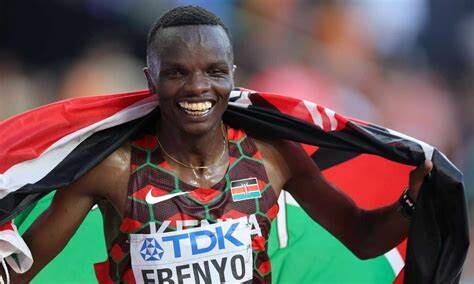
Seen as one of the favorites to represent team Kenya in Paris owing to his exploits in the 2023 World Championships and World Road Running Championships, Ebenyo failed to earn a ticket to feature at the Olympics.
The commonwealth games silver medalist is out to right a wrong with this year's Chicago Marathon, drawing inspiration from last year's Chicago Marathon hero and world record holder, the late Kelvin Kiptum.
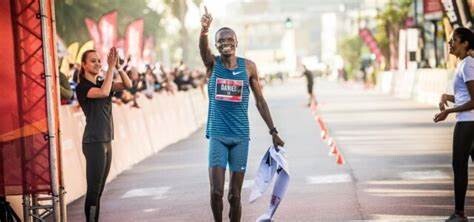
"It was last year when Kiptum broke the world record here (Chicago). And my dream since I started running was to start my marathon debut in Chicago which is fine and I'm looking forward for better result," Ebenyo told Citius Mag.
The Chicago Marathon debutant expressed happiness at being able to run again having missed out on the Olympics.
"No, I was never sad because I know this is sport and anything can happen and I am happy to race again," he added, when questioned on whether he was saddened by missing out on the Olympics.
Ebenyo has revealed that he does not plan to return to track and field any time soon as he shifts his focus.
"No for the track I think I'm done, going for the track now is only for the training. Because I need to focus on one at a time," revealed Ebenyo when questioned on whether he planned on returning to to the track.
"It's a bit crazy but I hope that everything shall be well and I hope for a beautiful start," he added on his Marathon debut.
Ebenyo is one to watch in this years' Chicago Marathon with his 12th ranking and a time of 59:30 in the half marathon.
(10/12/24) Views: 121Stephen Awino
TCS Toronto Waterfront Marathon elite field announced for 2024
We are just 10 days away from Canada’s largest race weekend: the 2024 TCS Toronto Waterfront Marathon. Since 2015, this event has also served as the annual Canadian Marathon Championships. This year’s race will feature everything from former champions and national record holders to rising stars looking to make their mark on the 42.2 km distance.
Here’s your cheat sheet for the men’s and women’s elite fields in Toronto.
Canadian men’s field
Andrew Alexander (Toronto): The 25-year-old former NCAA standout won the 2023 Toronto Waterfront Half-Marathon in 62:44. He is coached by Matt Hughes, the Canadian record holder in the men’s 3,000m steeplechase, and former Canadian marathoner Dave Reid. Alexander is aiming for a sub-2:10 finish at his hometown marathon.
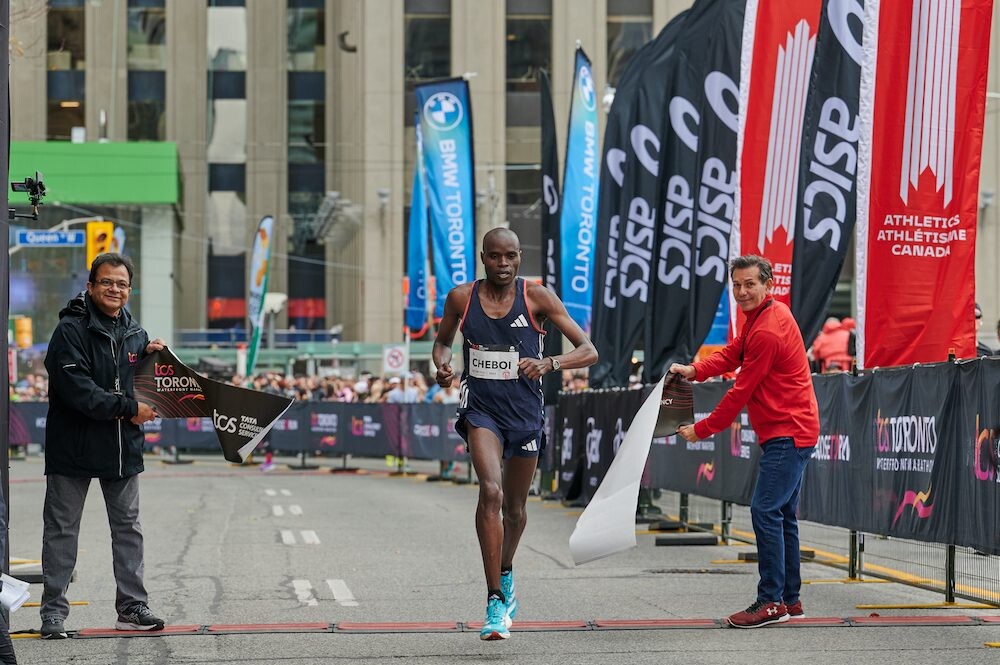
Thomas Broatch (Vancouver): The reigning Canadian marathon champion. He was the first Canadian across the line last year in his marathon debut (2:16:25). Four months later, Broatch took another shot at the distance, lowering his personal best by more than four minutes at the 2024 Houston Marathon (2:11:54).
Justin Kent (Surrey, B.C.): This will be Kent’s first time competing at the Toronto Waterfront Marathon. He ran his PB of 2:13:07 at the 2023 Prague Marathon, earning him a spot on Team Canada’s men’s marathon team for the 2023 World Athletics Championships.
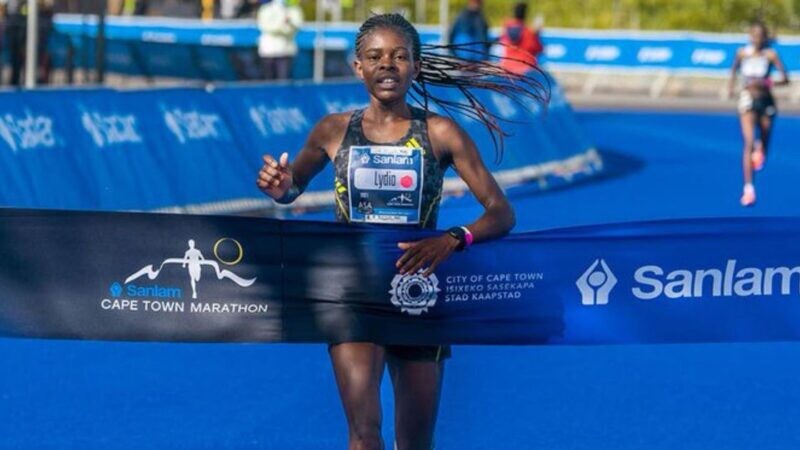
Maxime Leboeuf (Gatineau, Que.): Leboeuf finished third at the 2022 Montreal Marathon in 2:24:25. He’s a former graduate of Queen’s University XC program and an avid cross-country skier.
Kieran McDonald (Halifax): McDonald will be making his marathon debut in Toronto. He ran his half-marathon best of 65:45 at the 2024 Houston Half Marathon in January.
Alex Neuffer (Stratford, P.E.I.): Neuffer ran his PB of 2:21:34 at the 2022 Boston Marathon, finishing as one of the top Canadians. He’s a graduate of St. Francis Xavier University’s XC program and a training partner of Kieran McDonald (see above).
Thomas Nobbs (Vancouver): The 25-year-old will be running his second-career marathon in Toronto. He made his debut in Philadelphia last fall, running 2:19:13. Nobbs finished just off the podium at the 2024 Canadian 10K Championships, in 29:31. He also finished second at the Canadian Half Marathon Championships in Winnipeg in June.
Sergio Ráez Villanueva (Mississauga, Ont.): Ráez Villanueva has competed at the Toronto Waterfront Marathon for the last two years. He set his best of 2:18:04 here in 2022 (his marathon debut). Ráez Villanueva is self-coached and also coaches youth athletes in his hometown of Mississauga.
Tristan Woodfine (Cobden, Ont.): Coached by former Canadian Olympic marathoner Reid Coolsaet. Woodfine won the half marathon here in 2022. He has the fastest time among Canadian men in the field, with a PB of 2:10:39 from Houston earlier this year.
International men’s field
Elvis Cheboi (Kenya): Cheboi ran his personal best of 2:09:20 to win the 2023 Toronto Waterfront Marathon. (Reigning champion)
Mulugeta Uma (Ethiopia): Uma ran 2:05:33 to win the 2024 Paris Marathon in April. He has the fastest personal best in the men’s field.
Abdi Fufa (Ethiopia): Fufa finished just off the podium at the 2024 Dubai Marathon in January (2:06:23). He ran his PB of 2:05:57 at the Siena Marathon in 2021 (where he was second). The 29-year-old is looking for his first marathon win.
Hailu Zewdu (Ethiopia): The 29-year-old ran his PB of 2:06:31 at the Dubai Marathon in 2020. He has not broken 2:09:00 in his six marathons since.
Gizealew Ayana (Ethiopia): Ayana is the youngest elite athlete in the field–he’s only 21. He ran his PB of 2:07:15 to win the 2023 Paris Marathon in his debut at the distance.
Domenic Ngeno (Kenya): The 26-year-old is the fastest Kenyan marathoner in the Toronto field. He won the 2024 L.A. Marathon in March in 2:11:01. Ngeno’s PB of 2:07:26 was from a podium finish at the 2023 Eindhoven Marathon in the Netherlands.
Noah Kipkemboi (Kenya): A veteran of the marathon distance. The 31-year-old has competed at more than 10 marathons in his career. He podiumed at the Enschede Marathon earlier this year, with a time of 2:09:06.
Brian Kipsang (Kenya): Kipsang arrives in Toronto fresh off a personal best at the 2024 Milan Marathon in March, where he placed second in 2:07:56. The 30-year-old has finished in the top five at three of his last four races.
Abe Gashahun (Ethiopia): Gashahun has the fastest half-marathon personal best in the field of 59:46. He’s had success at shorter distances and cross country, but it hasn’t yet translated to the marathon. The 26-year-old ran 2:08:51 earlier this year in Saudi Arabia.
Sydney Gidabuday (U.S.A.): Former member of Adidas Tinman Elite Track Club in Colorado. Gidabuday made his marathon debut on Canadian soil at the 2023 Ottawa Marathon, where he finished ninth. His PB of 2:14:34 was run at the hilly NYC Marathon in 2023.
Yusuf Nadir (U.S.A.): Personal best of 2:15:27 from the 2023 Grandma’s Marathon in Duluth, Minn. He finished 25th at the U.S. Olympic Marathon Trials in February.
Aidan Reed (U.S.A.): Also made his marathon debut at the 2023 Ottawa Marathon–2:20:23. Reed ran collegiately at Southern Utah University, following in the footsteps of Canadian marathon record holder Cam Levins.
Canadian women’s field
Kate Bazeley (St. John’s, N.L.): The 40-year-old ran her PB of 2:36:35 in Toronto in 2019. Earlier this year, Bazeley represented Team Canada at the World XC Championships in Belgrade, Serbia.
Anne-Marie Comeau (Saint-Ferréol-les-Neiges, Que.): The 2018 Canadian (winter) Olympian ran her marathon best of 2:34:51 in Toronto last year, crossing the line as the second Canadian woman.
Asia Dwyer (Toronto): Dwyer ran her personal best of 2:42:45 at the 2023 Toronto Waterfront Marathon last fall. She told Canadian Running in an interview for the November/December 2024 issue of the print magazine that she is looking to smash her previous best.
Rachel Hannah (Port Elgin, Ont.): Hannah was the top Canadian finisher at the 2024 Ottawa Marathon in May. She won a bronze medal for Canada at the 2015 Pan-American Games in Toronto. She ran her personal best of 2:32:09 was at the 2016 Houston Marathon.
Liza Howard (Toronto): Howard told Canadian Running in an interview that her goal is to reach the podium and run a personal best. Howard ran her current personal best of 2:35:29 at the 2022 Chicago Marathon. She has unofficially broken the Canadian women’s 50K record, twice, in her marathon build for this race.
Erin Mawhinney (Hamilton): The 28-year-old runner will be making her marathon debut in Toronto. She is coached by two-time Canadian Olympian Reid Coolsaet. She broke the tape at the Toronto Waterfront Half Marathon last year, running a PB of 1:13:50.
Melissa Paauwe (Calgary). Paauwe is carrying the pride of Calgary into Toronto. She ran her PB of 2:41:12 at the 2023 Chicago marathon, and finished as the top Canadian.
Leslie Sexton (Markham, Ont.): Sexton returns to Toronto to run her hometown marathon. She said she will be trying to qualify for Worlds in Tokyo next year. She set her PB of 2:28:14 at the 2024 Houston Marathon this year, but missed the Olympic standard by two minutes.
Natasha Wodak: (Vancouver) started her marathon career here in 2013 but has not returned until this year; has never won the championship. Her PB of 2:23:12 from the 2022 Berlin Marathon stands as the current Canadian record.
International women’s field
Waganesh Mekasha (Ethiopia): Has a personal best of 2:22:45 from the 2019 Dubai Marathon. The 32-year-old Ethiopian won the 2023 Ottawa Marathon and finished second in Toronto last fall, with a time of 2:23:12.
Afera Godfay (Ethiopia): Godfay finished third behind compatriots Buze Diriba and Mekasha (see above) last year. She has a personal best of 2:22:41 and has finished in the top five in four of her last five marathons.
Roza Dejere (Ethiopia): The 27-year-old Ethiopian has the fastest personal best in the women’s field (2:18:30). She finished fourth in the women’s marathon at the Tokyo Olympic Games. She comes to Toronto as a threat to the course record of 2:22:16, which was set in 2019.
Meseret Gebre (Ethiopia): Gebre hasn’t raced since Toronto last fall, where she finished seventh in 2:29:54. She set her PB of 2:23:11 to win the Barcelona Marathon in 2022.
Valentina Matieko (Kenya): One of two Kenyan women in the international elite field. Matieko comes to Toronto fresh off a personal best earlier this year at the Paris Marathon in April (2:24:21).
Lydia Simiyu (Kenya): Simiyu ran her PB of 2:25:10 earlier this year at the Rome Marathon. She served a six-month doping suspension in 2022 after she tested positive for chlorthalidone after the Poznan Half Marathon in Poland.
Rediet Daniel (Ethiopia): Two top-five finishes in her three professional marathon starts. The 24-year-old Ethiopian ran her personal best of 2:26:25 at the 2024 Doha Marathon in February.
The TCS Toronto Waterfront Marathon, to be held on Oct. 20, is Canada’s premier running event and the grand finale of the Canada Running Series (CRS). Since 2017, the race has also served as the Athletics Canada marathon championship and Olympic trials.
(10/11/24) Views: 120Marley Dickinson
Kenyan debutant Nehemiah Kipyegon and Ethiopian newcomer Asmare Assefa win in Munich
Kenyan debutant Nehemiah Kipyegon took the 38th edition of the GENERALI MUNICH MARATHON, beating his challengers by a huge margin while also fighting against windy and rainy conditions. Taking into account the wet weather during the second half of the race the 26 year-old showed an impressive performance and clocked a highly respectable 2:10:02.
In a race without pacemakers he was in the lead throughout and achieved the fourth fastest winning time in the history of the event. Nehemiah Kipyegon was more than five minutes ahead of Siyum Tola. The Ethiopian ran his first marathon as well and finished in 2:15:29. Kenya’s Benard Chumba was third in 2:19:00.
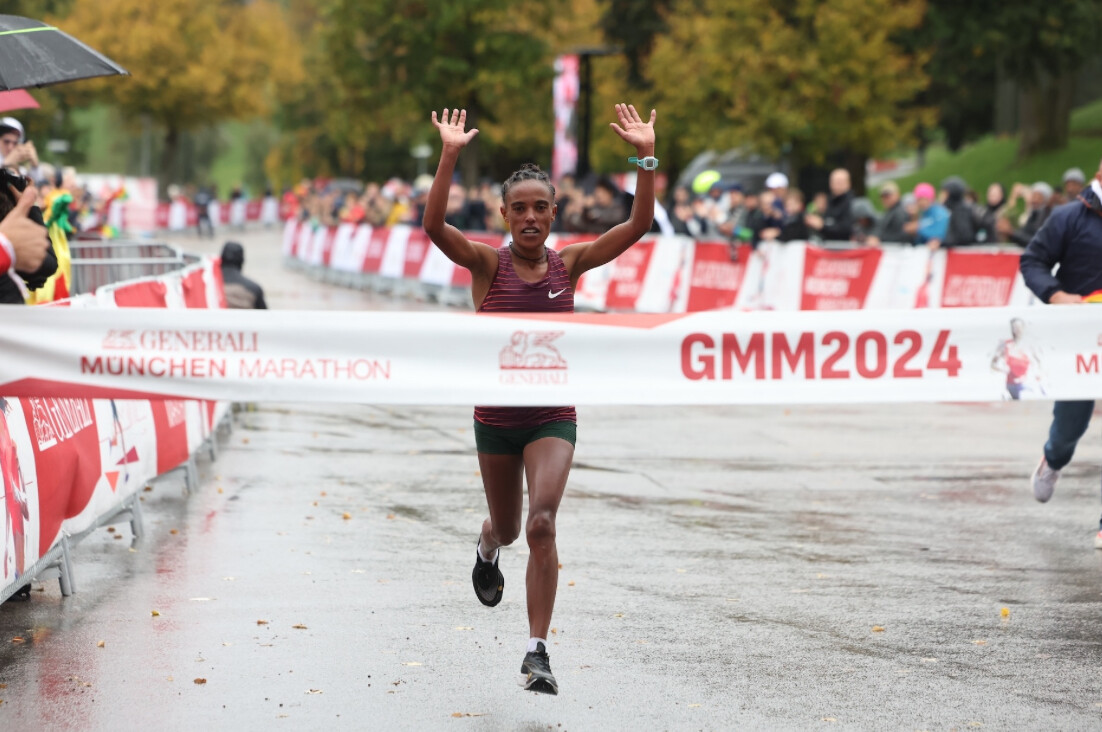
Running her first race in Europe Ethiopia’s newcomer Asmare Assefa won the race in 2:29:44. The 26 year-old clocked a personal best and the second fastest winning time of the GENERALI MUNICH MARATHON. Kenya’s Shamilah Kipsiror was second in 2:34:01 and Gelane Senbete of Ethiopia followed in third with 2:35:44.
Organisers of the GENERALI MUNICH MARATHON registered a record number of almost 28,000 entries from 120 nations including events at shorter distances. Among them were 6,250 marathon runners.
“Today we witnessed a superb event with an impressive entry record and we have further established the international standing of the GENERALI MUNICH MARATHON. We hope that we can continue staging this race,“ said Race Director Gernot Weigl, who also pointed out the huge financial benefit the marathon generates for the city of Munich. It is estimated that this is in the region of twelve million Euro.
Nehemiah Kipyegon, who had recently improved his half marathon PB to 60:34 in Copenhagen, took the lead right after the start with four runners following behind him. Without any pacemakers he then reached the half marathon point in 64:13. At this point only Siyum Tola and William Kibor of Kenya were still behind him. However Kibor dropped back soon after half way. The Kenyan suffered badly with muscle problems and later finished well behind in 2:26:13. In a duel of two debutants Tola could not hold on for long.
When Kipyegon ran sub 3:00 kilometre splits between 24 and 26k the Ethiopian was beaten. “He did not help pacing, so I decided to make a move,“ said Nehemiah Kipyegon, who lives and trains in Keringet which is in between Nairobi and Eldoret. “This is my biggest career win so far. I think I can run times of around 2:05 in the future.“
In the women’s race four runners passed the 10k mark in 34:54. Running without pacemakers as well Shamilah Kipsiror did most of the pacing. While Ethiopians Gelane Senbete and Gadise Negasa were dropped Asmare Assefa stayed behind the Kenyan. When the two passed the half marathon point in 73:34 they were almost a minute ahead already. With less than ten kilometres to go Assefa finally passed Kipsiror and quickly build a big lead. The Kenyan was so exhausted that she collapsed after crossing the finish line and needed medical treatment.
“I was able to stay behind Shamilah for a long period and it went very well for me. However it was getting difficult when the rain turned stronger at around 27k. I think in good weather conditions I would have been three minutes faster,“ said Asmare Assefa. “I would like to come back to Munich for this race next year.“
(10/13/24) Views: 117Chepngetich smashes world marathon record in Chicago with 2:09:56
Kenya’s Ruth Chepngetich took almost two minutes off the world record* at the Bank of America Chicago Marathon, winning the World Athletics Platinum Label road race in 2:09:56 on Sunday (13).
Not only did she obliterate Tigist Assefa’s world record of 2:11:53, set in Berlin last year, Chepngetich also notched up her third Chicago Marathon victory and chopped more than four minutes off her previous best of 2:14:18, set when winning her in 2022.

On a good day for Kenyan runners, John Korir took the men’s title in 2:02:43, the second-fastest time ever recorded in Chicago behind the world record of 2:00:35 set by the late Kelvin Kiptum last year.
Chepngetich’s intent was clear from the start. She breezed through the first 5km in 15:00 and had Ethiopia’s Sutume Asefa Kebede for company, and then reached 10km in an astonishing 30:14 with Kebede still just two seconds behind.
Chepngetich continued her relentless pace and hit the half-way mark in an incredible 1:04:16, the fifth-fastest clocking in history for the half marathon distance and putting her on course for a sub-2:09 finish. Kebede had started to drop behind, but she was still operating well inside world record pace, reaching the half-way point in 1:04:30, three minutes ahead of Joyciline Jepkosgei.
The gap between Chepngetich and Kebede continued to grow throughout the second half. The pace of both women dropped, Kebede’s more so than Chepngetic, and by 30km (1:31:49) the Kenyan had a lead of almost two minutes over her Ethiopian rival.
Chepngetich’s next 10km was covered in 31:22, which was her slowest of the race so far, but still remarkably quick and enough to increase her leading margin to more than six minutes. With little more than two kilometres left to run, she was still well inside world record pace, the likelihood of breaking it increasing with every step.
Spurred on by her memories of the 2022 race, when she missed out on the world record by just 14 seconds, Chepngetich powered through the final stages and crossed the line in 2:09:57, becoming the first woman to break 2:10. Remarkably, only nine athletes went quicker in the men’s race today.
“I feel so great. I’m very proud of myself. This is my dream. I fought a lot, thinking about the world record. The world record has come back to Kenya, and I dedicate this world record to Kelvin Kiptum.”
Kebede held on for second place in 2:17:32 while Kenya’s Irine Cheptai came through for third place in 2:17:52.
By contrast, the men’s race got off to a relatively conservative start before Korir broke away and sped up in the second half en route to a dominant win with huge negative splits.
A lead pack of 10 men ran together through the first 10km in 29:27, and they were still one big group as they passed through the half-way point in 1:02:19, putting them on course for a 2:04:38 finish.
Korir, along with fellow Kenyans Daniel Ebenyo and Amos Kipruto, continued to push the pace into the second half. By 30km, reached in 1:28:18, the lead group was down to seven men. But soon after, Korir increased his pace and broke free from the pack, creating a gap of 29 seconds by the time he reached 35km.
His leading margin continued to grow, and by 40km his lead was 92 seconds over Kipruto and Ethiopia’s Huseydin Mohamed Esa. Korir sped up in the final kilometres and crossed the line in 2:02:43, having covered the second half in 1:00:24. Esa was second in 2:04:39 and Kipruto third (2:04:50).
(10/13/24) Views: 115Dry saunas for runners: how useful are they?
For endurance athletes, it’s all about finding that extra edge—whether it’s a faster recovery, a boost in endurance or a way to handle extreme conditions better. Recently, the dry sauna has entered the spotlight as a potential training tool, touted for their health benefits, and their potential ability to speed up recovery while being a useful tool for heat acclimation. But can a dry sauna actually enhance endurance performance? Here’s what the science says.
How the dry sauna affects your cardiovascular system
When you step into a dry sauna, your heart rate will rise similarly to what you’d experience during an easy run. This increase in heart rate happens because your body is working to stay cool in the heat, which can lead to cardiovascular benefits. Some studies have shown that even a single session in a sauna has a positive effect on heart rate variability (HRV), a key indicator of cardiovascular health that’s often used by athletes. For endurance athletes, this could mean a more efficient heart, which may help when it’s time to hit the trails or track.

Heat acclimation and improved performance
Spending time in a sauna may also help you acclimate to higher temperatures, which can be the difference between finishing a race and taking a DNF when running in warm conditions. Research indicates that heat acclimation from regular sauna sessions can improve blood plasma volume, helping with thermoregulation and endurance. Your body becomes more efficient at cooling itself, meaning you might handle a hot race day a little better. Just 15 to 20 minutes a few times a week could potentially make a difference.

The muscle-recovery angle
Endurance athletes know that recovery is as important as the workout itself. Sauna use has been shown to reduce muscle soreness by boosting circulation, which helps deliver nutrients to muscle tissues and remove metabolic waste. A post-run sauna session could potentially speed up recovery, allowing you to bounce back faster for your next workout. Studies suggest that heat exposure increases the release of human growth hormone, which aids in muscle repair.
Pay attention to how you feel
While sauna sessions offer intriguing benefits, they’re not a substitute for actual training. Saunas are also dehydrating, so it’s essential to rehydrate thoroughly afterward. If you have any cardiovascular concerns or other medical conditions, consult a professional before diving in. It’s all about balance—sauna use can be a valuable supplement to an existing training routine, but is not a replacement for it.
(10/12/24) Views: 114Keeley Milne
Vedanta Delhi Half Marathon 2024: Muktar Edris, Eilish McColgan lead field
The Vedanta Delhi Half Marathon 2024, a World Athletics Gold Label Road Race, is set to witness a world-class international roster headlined by Two-time Olympic gold medalist Joshua Cheptegei. He will be joined by the two-time 5000m World Champion Muktar Edris, which increases expectations for a course record in the men’s race.
The women’s field includes the 2022 Commonwealth Games champion in the 10,000m, Eilish McColgan. This prestigious event will take place in the heart of India’s National Capital on Sunday, October 20, 2024.
Fresh from his victory in the 10,000m at the Paris 2024 Olympics, Uganda’s Cheptegei is poised to make his debut in the Vedanta Delhi Half Marathon and has been a three-time World Champion in the 10,000m and boasts a personal best of 59:21 in the Half Marathon. His stellar career also includes a 5,000m gold and 10,000m silver at the Tokyo 2020 Olympics.
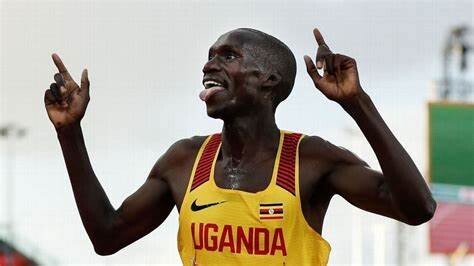
Ahead of the race, Cheptegei expressed: “I’m incredibly excited to debut at the Vedanta Delhi Half Marathon. This race is known for its energetic atmosphere, fast course, and unmatched Hospitality. I can’t wait to soak it all in and push myself to deliver a memorable performance. With such a competitive line-up, it will be an exciting challenge, and I’m aiming for nothing less than the top spot.”
Cheptegei will face formidable opposition from Ethiopia’s Muktar Edris, who will be returning to the Vedanta Delhi Half Marathon after 2022. A star of the sport at the junior level, Edris finished fourth on debut in the Delhi Half Marathon in 2020 with an impressive run of 59:04. Before that, he won two world championship titles in the 5,000m during 2017 and 2019.
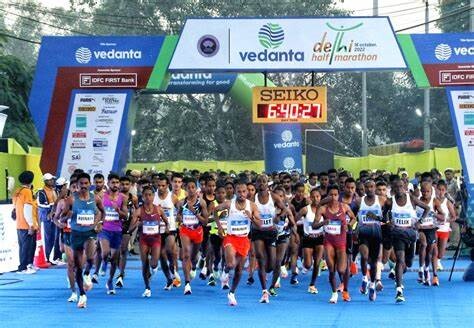
Eilish McColgan leading women’s line-up
Eilish won gold in the 10,000m at the 2022 Commonwealth Games in Birmingham, setting a new Games record, and settled for silver in the 5000m.
McColgan holds the European record for the 10 km road race and British records for multiple distances. She has also represented Great Britain in four Olympic Games (2012-2024) and Scotland in three Commonwealth Games (2014-2022). She holds Scottish records in multiple events and has claimed seven national championships, cementing her status as one of Scotland’s most accomplished runners. Last year, she won the Berlin half-marathon with a personal best 65:43.
Several top athletes, including Kenya’s Cynthia Limo (66:04), Ethiopia’s Yalemget Yaregal (66:27) and Tiruye Mesfin (66:31), and Tanzania’s Magdalena Shauri (66:37), are joining McColgan in the women’s race. With five women having clocked times under 67 minutes, the competition promises to be thrilling and fast-paced.
Ethiopians Amdework Walelegn (58:53) and Yalemzerf Yehualaw (64:46) have held the Course Records in the Vedanta Delhi Half Marathon since 2020.
The Vedanta Delhi Half Marathon, with a prize pool of USD 260,000, will begin at the iconic Jawaharlal Nehru Stadium, where elite athletes will be joined by India’s top runners and passionate amateurs, united in the spirit of #AaRangDeDilli.
(10/14/24) Views: 114Khel Now
How to (Actually) Burn Off Belly Fat—and Why It Matters
Of all the baseless fitness myths to have been peddled through ages of infomercials and influencers alike, the notion that you can “blast belly fat” is among the most audacious. Targeted fat loss, or spot reduction, is simply not a thing that our bodies are equipped to do.
“You can't spot reduce, no matter how promising the marketing and ads that tell you that's the case,” says Chris Mohr, PhD, RD, cofounder of Mohr Results. “While it would be nice if you could lose fat from wherever you’d like, your body handles fat as it wants.”
However, while you may not be able to bump belly fat to the front of your fat-loss queue, that’s not to say you can’t shed it. You absolutely can. Unlike the other 90% or so of fat that we carry on our bodies, belly fat—or visceral fat, to use its government name—is a particularly dangerous brand of baggage that has been shown to significantly raise your risk of a long list of serious health conditions. And the longer you ignore it, the harder it is to shake.

Here, we’ll explain why belly fat is worth your attention. Better yet, with the help of medical and fitness experts, we’ll tell you how to lose it—and won’t even try to sell you a DVD.
Why is belly fat more dangerous than “regular” fat?
Generally speaking, when we talk about fat, we’re talking about subcutaneous fat—the fat that resides just
How to tell if you’re carrying around excess belly fat
The most accurate way to measure your visceral fat would be with a CT or DEXA scan, although those aren’t necessarily practical or cost-effective for most people. Fortunately, in this case, a simple waist-to-hip ratio is more useful than specific numbers, so a regular old tape measure will do the trick.
“Basically, it's the ratio of your waist-to-hip circumference,” says Dr. Kumar. “For a man, we don't want it over one, meaning we don't want the waist to have a larger circumference than the hips. Low health risk is 0.95 or lower. And then high health risk is one or higher.”
Other warning signs that you might be approaching dangerous levels of belly fat can include elevated blood sugar, low testosterone, or even snoring and trouble swallowing. “As you accumulate visceral fat, you're probably slowly accumulating fat around other organs, like the esophagus and the trachea,” says Dr. Kumar.
How to burn off belly fat
The way we gain visceral fat is kind of like how you might rack up financial debt. Once your subcutaneous fat stores exceed their optimal level, excess calories begin getting stored as visceral fat, says Dr. Kumar. The main difference would be there’s no way to prioritize paying down your anatomical overdraft. But even though we can’t target visceral fat alone, there are a few things you can do to optimize your diet, workouts, and lifestyle so that you’re actively chipping away at it.
Prioritize Resistance Training and HIIT
A Harvard study that tracked the measurements of 10,500 American men over a 12-year period determined that weight training was more effective at reducing waistline size than any other activity, including moderate to vigorous aerobic training.
“When you strength train, two powerful things are happening,” says Luke Carlson, founder and CEO of Discover Strength. “The first is that you add lean muscle tissue to your body; the more lean muscle tissue you have, the more calories you're burning at rest, which means you're not storing those calories as fat on the abdomen. And the second is that when we do a tough strength training workout, we acutely burn five to nine percent more calories for the next three days.”
“What happens when you lift weights and increase your lean body mass is you become more sensitive to the hormone insulin,” explains Dr. Kumar. “Visceral fat is actually very insulin-resistant and comes along with a condition called insulin resistance. Building muscle treats insulin resistance, which reduces belly fat.”
While steady-state cardio has not proven to be particularly effective for burning visceral fat, high-intensity interval training (HIIT) running workouts have. Want to really kick things into high gear? Throw some strength exercises into an interval-based running workout.
Increase protein while decreasing overall calories
Carbs get villainized, but when it comes to fat loss it’s really all about creating an overall calorie deficit rather than
Don’t let poor sleep sabotage your progress
“The other piece that has to be discussed is certainly sleep,” says Dr. Mohr. “There have been studies showing that when you sleep less, you eat more and gain more weight.”
In one recent study, published last year in the journal Sleep Medicine, researchers reported a “significant” inverse association between sleep duration and visceral fat mass. In other words, the less sleep people got, the more visceral fat they gained. Interestingly, subcutaneous fat was not affected, strengthening the connection between sleep and visceral fat in particular. It’s also worth noting that the waistline-protecting benefits of sleep appeared to top out at eight hours.
While sleep alone probably isn’t going to burn off your gut, don’t let it be the thing that undermines all of your other efforts to reduce belly fat. “We know that sleep plays a huge role in weight loss and weight gain,” says Dr. Mohr. “It’s a big piece of the puzzle that we need to think about.”
(10/12/24) Views: 110

